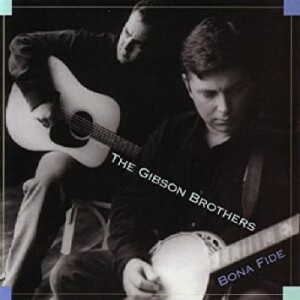 The Gibson Brothers, Eric and Leigh, hail from upstate New York, and they play a brand of bluegrass that’s influenced by New England folk music as much as by Appalachian string bands. They have top-notch picking (Leigh on guitar, Eric on banjo), strong songwriting and capable sidemen, on top of which they lay their sweet sibling harmonies for a very appealing package.
The Gibson Brothers, Eric and Leigh, hail from upstate New York, and they play a brand of bluegrass that’s influenced by New England folk music as much as by Appalachian string bands. They have top-notch picking (Leigh on guitar, Eric on banjo), strong songwriting and capable sidemen, on top of which they lay their sweet sibling harmonies for a very appealing package.
This is their fourth album, first on Sugar Hill, and their years of playing and touring together show. They’re tight without being slick, good players but not show-offs, except on the one high-voltage instrumental, appropriately titled “Shucking the Corn.” Eric says in the liner notes that this is his first recorded banjo instrumental in 20 years of playing (the brothers are in their early 30s), and gives props to mandolinist Marc MacGlashan, who really tears it up on this number.
Elsewhere, it’s solid musicianship and good songs delivered in a straightforward manner — and those harmonies — that make this a winning disc.
They kick it off with “The Open Road,” a strongly melodic mid-tempo folk song on a contemporary theme, in a traditional setting with lots of fiddle fluorishes from Jason Carter. Then there’s “Arleigh,” a tribute to the boys’ grandfather, in a strong three-four rhythm set by Sam Zucchini on the bhodran — an instrument you don’t hear in every bluegrass band. We’re at track three before we have a traditional-sounding bluegrass song, the medium-fast tempoed “Ragged Man,” a classic tale of brother vs. brother.
From there on, the songs swing from folk to bluegrass and back again. “Railroad Line,” with its accordion wails, has a Texas country-folk feel to it. The subject matter is pure folk, about the end of the line for a mill community. “Vern’s Guitar” is a sad tale of an old man who can’t play his guitar any more and the younger musician who refuses to buy the instrument and break the old man’s heart. The brothers pay tribute to Tom T. Hall with a cover of his “Don’t Forget the Coffee, Billy Joe,” a sadly sweet ballad that features Hall in a brief cameo. And “Norma” tells the tale of a woman who only wears her wedding ring on Sundays when she visits her husband in jail.
Things kick into overdrive on “That Bluegrass Music,” a hot tribute to Bill Monroe, Lester Flatt, Earl Scruggs and all those great bluegrass pioneers. “Where Nobody Knows My Name” is pretty straight bluegrass, with rock-influenced triplets on the catchy chorus, and echoes of Merle Haggard in Eric’s vocal stylings. “Whisper in My Ear” is a straight-up honky-tonk song about a cheating woman who puts the blue in bluegrass.
Things get really interesting on the traditional “Beautiful Brown Eyes” and the gospel closer, “The Lighthouse.” Sister Erin Gibson joins in on these two songs. Their three-way harmonies are heavenly.
Mike Barber on upright bass plays the first notes heard on Bona Fide, a downward-running lick that opens “The Open Road,” and his solid rhythm sets the pace all the way through. But everyone involved gets a few turns at instrumental breaks, and none disappoint.
The Gibson Brothers in Bona Fide set the bar high for modern bluegrass. They show that they’ve mastered the traditional form, and they’ve added just enough of their own touches to make it their own, not some slavishly copied note-for-note replay of the classics. It’s a winning combination.
(Sugar Hill, 2003)
